

Innovation is a Geographically Localized and Temporary Phenomenon. China may now be the most innovative place on earth, but India may soon replace it as the world’s innovation leader My article for Discourse: Innovation is the “main event” of the modern age.
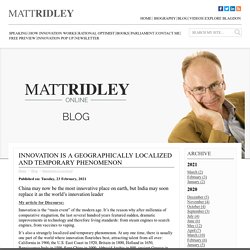
It’s the reason why after millennia of comparative stagnation, the last several hundred years featured sudden, dramatic improvements in technology and therefore living standards: from steam engines to search engines, from vaccines to vaping. It’s also a strangely localized and temporary phenomenon. At any one time, there is usually one part of the world where innovation flourishes best, attracting talent from all over: California in 1960, the U.S. Today, the most innovative part of the world is probably China. Chinese consumers are wholly mobile in their use of the internet, floating free of fixed computers. As for discovery and invention, China is just as innovative, plunging into artificial intelligence, gene editing, and nuclear and solar energy with a gusto that the West can only dream of. Job losses in pandemic due to performance issues, say nearly half of Britons. Nearly half of people believe those who lost their job during the pandemic were likely to have been underperforming, a survey has found.
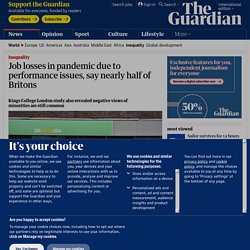
In findings that will raise fears over inequalities in Britain, a study of attitudes by researchers at Kings College London showed a significant minority thought a widening post-Covid income gap between white people and BAME groups would not be a problem. “This analysis throws up the complexity of people’s view about inequalities,” said Paul Johnson, director of the Institute for Fiscal Studies, which will use the research for its five-year review of inequalities. “The British public is clearly concerned about some inequalities, but also sets great store by individual responsibility.” People care more about differences between geographical areas than races, genders and generations, found researchers in the study entitled Unequal Britain. ... as you join us today from Canada, we have a small favour to ask. Why this is the year for regulation that finally reins in AI. Thread by @adamjohnritchie on Thread Reader App. 826 views I was involved in getting the #oxfordvaccine@JennerInstitute manufacturing process and consortium up and running.
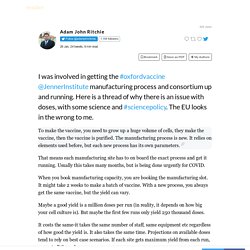
Here is a thread of why there is an issue with doses, with some science and #sciencepolicy. Why has Britain suffered more than 100,000 Covid deaths? On nearly every metric, the UK death toll from coronavirus has now exceeded 100,000.
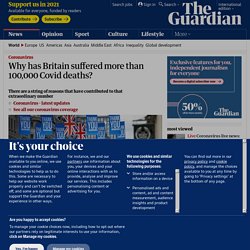
Here, we look at why that figure is so high. Health of the nation. Private rents fall in UK's biggest cities by up to 12% amid Covid crisis. Private rents in some of the UK’s biggest city centres have fallen by up to 12% in a year but have risen sharply in parts of northern England as some tenants swapped an urban life for the suburbs, smaller towns and villages.
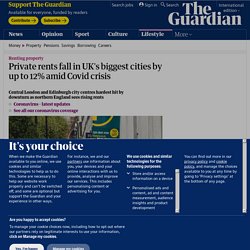
Property website Rightmove’s latest rental trends report said the pandemic had led to falling asking rents and a “flood” of properties coming on to the market in many areas. Central London has been “hardest hit”, said the website, with average asking rents down by 12.4% on a year ago, followed by Edinburgh city centre, which was down 10%, and Manchester city centre, down 5.3%. Away from city centres it was a different picture, with agents reporting busy markets and rising rents. 'Stressed' millennials are setting the agenda at work.
A snowflake millennial is tougher than you think, especially in the workplace.
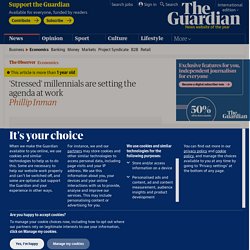
They have watched their parents cope with an increasingly insecure jobs market since the turn of the century and in growing numbers told their friends and family that long hours, short term contracts and a shouty boss is not for them. They don’t join trade unions or argue with the boss about a pay rise, though some do. Their confidence – however much they appear to quiver and quake – gives them the steel to quit and search for a different job that comes – they hope – without the debilitating stress that wrecks everyone’s physical and mental health.
It’s why many of the world’s largest companies, keen to avoid losing their better-educated younger employees, are adopting new ways of working. Even those who chase jobs in the professions – architecture, engineering, medicine and the law – and kid themselves that it is worth the bullying, low wages and debt, are questioning their priorities. Unilever workers will never return to desks full-time, says boss. The boss of Unilever, one of the UK’s biggest companies, has said his office workers will never return to their desks five days a week, in the latest indication that coronavirus will transform modern working life.
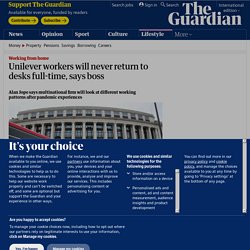
Alan Jope, the chief executive of the consumer goods group, said the company would also encourage all of its employees to receive vaccinations against Covid-19, but would stop short of making jabs mandatory. Employees who opt not to be vaccinated, however, will face mandatory testing. Jope said the company would look at different working patterns after it saw during the pandemic that it could adapt and make big changes far more quickly than previously thought. Unilever, the third most valuable company on the London Stock Exchange, is the maker of brands including Dove soap, Ben & Jerry’s ice cream and Marmite. It also owns Hellman’s, Knorr, Lipton and Persil. London population set to decline for first time since 1988 – report. London’s population is set to decline for the first time in more than 30 years, driven by the economic fallout from the coronavirus pandemic and people reassessing where they live during the crisis, according to a report.
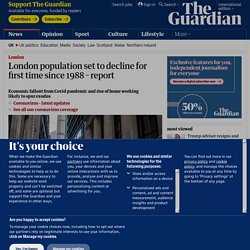
The accountancy firm PwC said the number of people living in the capital could fall by more than 300,000 this year, from a record level of about 9 million in 2020, to as low as 8.7 million. This would end decades of growth with the first annual drop since 1988. The forecast comes as city-dwellers rethink their living situations during lockdown and a boom in home working during the pandemic encourages growing numbers of people to consider moving elsewhere.
Other drivers include a smaller number of graduates moving to London, fewer job opportunities in the capital and lower international migration to the city as a result of the pandemic and Brexit. The next normal arrives: Trends that will define 2021—and beyond. Businesses have spent much of the past nine months scrambling to adapt to extraordinary circumstances.

While the fight against the COVID-19 pandemic is not yet won, with a vaccine in sight, there is at least a faint light at the end of the tunnel—along with the hope that another train isn’t heading our way. Audio 2021 will be the year of transition. Barring any unexpected catastrophes, individuals, businesses, and society can start to look forward to shaping their futures rather than just grinding through the present. The next normal is going to be different. WHO warns of 'another pandemic' with humans sleepwalking into Disease X. WHO warns Covid pandemic 'not the big one' and Disease X is 'emerging' How COVID-19 Is Impacting Where People Decide to Live – BRINK – News and Insights on Global Risk. The coronavirus has changed people's attitudes and behaviors in ways that could erode the attraction of urban living, and many companies are already reconsidering their need for big-city office space.

Boris Johnson will get a deal: but it will be a betrayal of the Brexiters. Ignore the blustering brinkmanship: there will be a deal between Britain and the EU. This week, next week or in the final second before the clock strikes 12, this Brexit-crazed government will sign on the line. It needs no crystal ball to foresee a deal. Though this government is disgraceful and dishonest, it is not certifiably insane. It will not kill off the car industry, manufacturing, farming, finance and fishing.
It will not cut off security and police relations with Europe. Time to ditch the Dominic Cummings technocratic, mechanical vision of government. If crises bring with them new opportunities to think afresh, then the combined impact of Brexit and COVID has been to focus attention on the capacity and structure of the British state. This rethinking is increasingly framed in terms of “smart government”. Dominic Cummings, the prime minister’s now departing chief adviser, has been at the centre of a drive to “harness the power of data and technology” at every turn.
Technology has a role to play in modern government, but what Cummings seems intent on fashioning appears something closer to a populist technocracy based on a belief in algorithmic governance. Our argument is simply that this logic, and these ideas, should be dropped. Travel Bubbles in Asia Offer Hope for Global Aviation – BRINK – News and Insights on Global Risk.
A passenger arrives from New Zealand at Sydney International Airport in October 2020. Australia and New Zealand became the first countries in Asia-Pacific to implement a travel bubble. Photo: David Gray/AFP via Getty Images The idea of “travel bubbles” first rose to prominence earlier in 2020, when the COVID-19 pandemic brought global air travel to an abrupt standstill. In theory, jurisdictions, which have successfully contained coronavirus, would agree to open borders to each other, dispensing with the need for travelers to quarantine. Risk of transmission remains low for passengers moving within the bubble, while importation of new cases from outside is curtailed. Global Flyers Grounded. NPR Choice page. COVID-19 Reports: What Experts Expect & Propose – The Security & Sustainability Guide. Published 1 Aug, 2020. 1st update 11 Sept, 2020. 2nd Update 10 Oct,2020.
Download as PDF here The COVID-19 pandemic has already changed our world and is still underway with no end in sight. The crisis will likely continue over several years, if not longer. Some countries are beginning to slowly re-open after lockdown, while others are facing a sharp upswing in infections, e.g. Brazil, Mexico, India, and Russia. A quick tech fix treatment or vaccine is unlikely, despite Operation Warp Speed by the U.S. government, to deliver 300m doses of a vaccine by January, and over 165 potential coronavirus vaccines in development worldwide (#46). Coronavirus: Missing tests blunder caused by software ‘13 years out of date’ The blunder that saw 16,000 positive Covid-19 tests go missing was caused by failing to replace software an astonishing 13 years out of date, experts believe.
It could handle only about 65,000 rows of data, rather than the million-plus that the newer software XLSX is capable of – which meant any additional test results were lopped off. The revelation will pile further pressure on Matt Hancock, the health secretary, who has refused to discuss details of the fiasco, or explain why modern software was not used. Is COVID-19 Accelerating a Shift of Service Jobs to the Developing World? – BRINK – News and Insights on Global Risk. Staff work at a call center in Hyderabad. Services are less difficult to develop than a manufacturing sector because you don't need ports and well-functioning infrastructure. Covid-19 has changed working patterns for good, UK survey finds. From plague to penury - The pandemic is plunging millions back into extreme poverty. Arundhati Roy: ‘The pandemic is a portal’
Who can use the term “gone viral” now without shuddering a little? Who can look at anything any more — a door handle, a cardboard carton, a bag of vegetables — without imagining it swarming with those unseeable, undead, unliving blobs dotted with suction pads waiting to fasten themselves on to our lungs? Who can think of kissing a stranger, jumping on to a bus or sending their child to school without feeling real fear? Another day not at the office: will working from home be 2020's most radical change? Landlords slash rents by up to 20% as tenants quit city centres in pandemic. Private rents in some parts of London have tumbled by up to 20% as tenants quit the capital, the number of international students plummets and companies put relocation plans on hold. A glut of rental properties on the market means many landlords have had to slash rents in order to attract tenants. Tracking the COVID-19 economy - Atlantic Council. China is experiencing an incredible Q2 economic rebound while the other 5 largest economies suffer historic downturns.
This ‘fractured recovery’ puts enormous stress on supply chains and the global trading system. 'My company has gone fully remote and I'm despairing': who wins in the new world of working from home? I am 20 minutes into my scheduled 30-minute call with Shivani Maitra when I start to freeze. Maitra, a partner at global consultancy firm Deloitte, is leading the firm’s post-Covid-19 research into the future of work, and is giving me a seamless analysis of what business is about to look like: more autonomy, more remote work, happier workers, more accessible leadership – all facilitated by technology. But I can’t get Skype for Business to function. It’s a hot day and the connection comes and goes, leaving me contorted and sweating over my laptop.
The future of the office - Covid-19 has forced a radical shift in working habits. The ancient computers in the Boeing 737 Max are holding up a fix. AA brand-new Boeing 737 Max gets built in just nine days. In that time, a team of 12,000 people turns a loose assemblage of parts into a finished $120 million airplane with some truly cutting-edge technology: winglets based on ones designed by NASA, engines that feature the world’s first one-piece carbon-fiber fan blades, and computers with the same processing power as, uh, the Super Nintendo.
The Max has been grounded since March 2019, after some badly written software caused two crashes that killed 346 people. And while Boeing has received plenty of scrutiny for its bad code, it’s the Max’s computing power — or lack thereof — that has kept it on the ground since then. Every 737 Max has two flight control computers. Hundreds of Post Office workers ‘vindicated’ by High Court ruling over faulty IT system that left them bankrupt and in prison. Low demand for UK office workers reveals ‘asymmetric recovery’ Returning to the office: how to stay connected and socially distant. Complex systems science allows us to see new paths forward. Our response to COVID-19 will help define the 21st century. Lagos's poor lament Covid fallout: 'we don't see the virus, we see suffering' The age of the office is over – the future lies in Britain's commuter towns. Effect of the COVID-19 pandemic response on intrapartum care, stillbirth, and neonatal mortality outcomes in Nepal: a prospective observational study - The Lancet Global Health.
Pay Cuts Become a Tool for Some Companies to Avoid Layoffs. London high-rise offices to suffer 'dramatic' dent in demand, say experts. How Int’l Collaboration Is Helping To Win A War Greater Than The COVID-19 Pandemic. BP mulls radical reduction of office space in move to flexible working. Half of Nepal’s girls may drop out of school. Return to work: a sector-by-sector look at the plans of England's major employers. Future shape of offices: proposals to make workplaces safe. Google employees will work from home until at least summer 2021. Covid-19 to send almost all G20 countries into a recession - Economist Intelligence Unit. Localtrust.createsend1.com/t/ViewEmail/j/C320ECAD5C29C9082540EF23F30FEDED.
The great acceleration. The Coronavirus Is a Special Mental-Health Disaster. How the elephant lost its trunk - The Post. Greater Capitalism: How The Pandemic Is Permanently Reshaping Our Economic System For The Better. How the Dutch invented our world. The existential threat to small business from the coronavirus. The future is not what it used to be. Futuribles executive summary covid 19 crisis possible scenarios for the next 18 months 1. Coronavirus' business impact: Evolving perspective. The Coronavirus and Our Future. How coronavirus is widening the UK gender pay gap. The Coronavirus Pandemic Lockdown Was an Economic Revolution. Invest in the green economy and we'll recover from the Covid-19 crisis. This crisis has the capacity to be apocalyptic - Engelsberg Ideas. How the coronavirus pandemic is undoing globalization - Washington Post.
The Corona Class Wars: A Pandemic Fueled by Inequality - DER SPIEGEL. In place of vision: Boris Johnson tinkers with Whitehall while Britain is adrift. Will Covid kill off the office? Oecd countries respond to the coronavirus crisis. This Scientist Predicted 2020 Would Bring Major Upheaval. How Covid-19 will change the world.
We're not all going to be working from home, nor should we. Here's why. Trust in Government Surges During the COVID-19 Crisis – BRINK – News and Insights on Global Risk. Where might this all lead? Unexpected options and outcomes... and some solace. How pandemics past and present fuel the rise of mega-corporations. Ninety Thousand Dead and Counting - Eudaimonia and Co. AI firm that worked with Vote Leave given new coronavirus contract. 48 – The Post Corona World – Matthias Horx. The New Leader of the Free World - Eudaimonia and Co. Coronavirus pandemic is a disaster for the world, but a few good things might emerge from it.
Lives vs lives – the global cost of lockdown. It's worth taking a risk over Covid-19. The man who predicted 2020. Here’s what the new normal looks like. The Conspiracy Myth. The neoliberal era is ending. What comes next? - The Correspondent. Why the Economy Is Headed for a Post-Coronavirus Depression. Ahmet Altan: I’m watching the coronavirus crisis unfold from a Turkish prison. This is why I’m hopeful. (99+) The Fool on the Hill. Death of the office. What’s the point of an office? Will Covid spell the end of city life? 10 Interesting and Inclusive (COVID19 Triggered) Citizen Moves. The Pandemic Bodes Ill for Both American and Chinese Power. Now is the Time to Rethink our Communities. Xi Jinping and Vladimir Putin are the big losers from this pandemic. Flexible working will be norm after lockdown, say Barclays and WPP bosses. Physical distancing will end era of cheap air travel, industry warns.
Coronavirus crisis could double number of people suffering acute hunger - UN. How Sweden Is Fighting Coronavirus. Year of the Rat. The Strategic Consequences of the Coronavirus Crisis. Why this crisis is a turning point in history. What Happens When a Society Can’t Speak the Unspeakable.